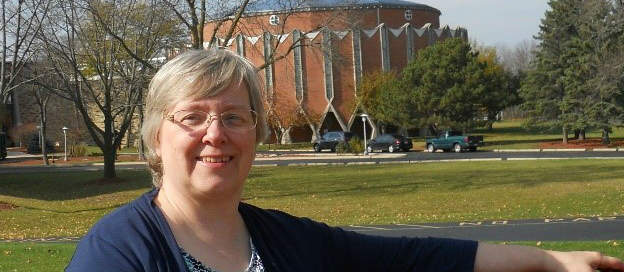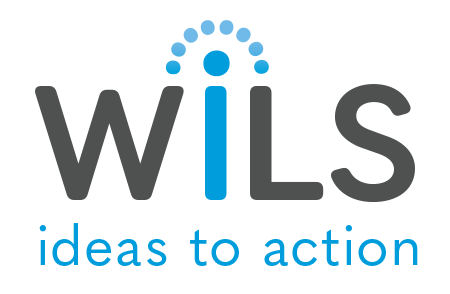
One of our greatest joys at WiLS is hearing our members tell the stories of the big and important work they are doing – interesting new projects or initiatives, or even interesting and new approaches to old projects. And, in addition to hearing about it, it makes us even happier when we can share those stories with other members. Each month, WiLS is proud to feature an interview with one of our library members. This month, we interview Kathy Harty, Resource & Education Services Librarian at Sacred Heart Seminary & School of Theology.
If you have questions about this interview or want to suggest someone for us to interview, contact Andrea Coffin at acoffin@wils.org.
Why did you, personally, choose to work in libraries?
Originally, I was between junior and senior year in college, majoring in history, and had no clue what to do “when I grow up”. My brother was a counselor at a community college in upstate New York, and we visited him on vacation that summer. He had a new-fangled computer program that would give you a list of possible vocations/jobs, and librarian was on the list. I saw that, said “I like books”, and went to graduate school. I’ve always enjoyed jobs that help people, and I liked answering questions, so public services was a natural fit!
When I was on the job market, I was told about an opening at a seminary in Milwaukee. I enjoyed theology, got the job, and have enjoyed working here ever since.
Our students used to be considered unusual for Catholic seminaries, in that they are ‘second-career’ vocations – they have been doctors, lawyers, ranchers, truck-drivers, fathers and grandfathers. The average age this year is 42. They discover a call from God, and come here to learn what’s needed to be good priests. I’ve found it fascinating to interact with them over the years. They may not always come with a strong academic background, but they have a real love to serve and minister to those in need, so it’s inspiring to work with them. They have kept me on my toes, and wanting to make sure they succeed to go out and help God’s people.
What is unique about the culture of your library? How do you influence it?
Our library is available to students 24/7, because we’re basically a residential school. So it’s not unheard of to have students come down at all hours, do their studying or writing, then lock up and leave. Since we have self-check, that’s easy for them.
One of the charisms or spiritual gifts of the sponsoring religious order (the Priests of the Sacred Heart, or SCJ) is hospitality, so we’ve always been welcoming and cheerful to patrons. We don’t stand on a lot of formality; we’re on a first-name basis with all our students (and they with us), and we offer a lot of assistance with research or writing needs. Since many of our students are coming back to academics after a gap (or never having experienced higher education), we work with them to succeed more one-on-one than might be usual in graduate school.
I have also heard stories about bad experiences they had with librarians in their pasts (probably when they were in grade school), and have made it my mission to make sure they see we’re wonderful, helpful people who have their best interests in mind, rather than remote ‘professionals’ (in the negative sense). And it’s wonderful to see them grow into being public figures who have gained further insights into dealing with the hurt and pain of other human beings.
What do you think is important to know about the patrons or community you work with? What helps you understand those needs?
Training for the Catholic priesthood involves four “pillars”: human formation, spiritual formation, pastoral formation, and intellectual formation. It’s not just academics. They may be teaching in parishes or working in nursing homes. They need time for prayer. They need to make sure they’re taking care of normal human growth. Those other areas are just as important in training good priests. They also take time and work, so getting the sources you need academically shouldn’t be an issue or take your whole evening. We try to make it as easy as possible to find materials (for any of those “pillars”).
I’m a member of the faculty, and we vote on each and every student every year; we recommend whether or not they should advance to the next level of studies. I mentor for the case study paper, which is part one of a capstone project in their final year of study. The purpose of that paper and seminar is to demonstrate how well they are able to integrate their studies in pastoral situations. So I’m in touch with what’s needed by them.
We also have a Master of Arts program, which is a smaller enrollment then the seminary program. Those students often work in parishes or other facilities, and they have families. Coming back to earn their masters is a sacrifice for them. I went back to school and earned my Master of Arts in Theology while working at Sacred Heart, and so I feel I can understand what they’re going through, and what’s needed.
What big ideas are being worked on at your library? What problems are being solved?
We are experimenting with the embedded librarian concept, even though we don’t offer distance or online classes. I’m working with a couple of professors to add resources and content to their classes as the semester progresses. We’ll evaluate how that goes at the end of the school year.
The school has a Writing Consultation Service to assist students in improving their writing. ESL students or those with difficulties in writing can either go to the consultant themselves or are referred by faculty members.
We offer a required non-credit 2-session workshop at the beginning of each semester to all new students introducing them to graduate studies. I team-teach the Theological Studies Workshop with the Writing Skills Associate. We cover note-taking, library and research skills, paper-writing, citation, plagiarism, etc.
We have laptops, an iPad, flash drives, digital cameras, and scanning available for check-out to patrons. We offer some tech help as needed. We’re currently in discussions regarding a project, which originated in Belgium, regarding Fr. Leo John Dehon, the founder of the Priests of the Sacred Heart. We’re looking at how to make those resources available to SCJs worldwide in some way.
From time to time we offer “Lunch ‘n Learns”, sessions on some technology or library-based needs. For these, we have students bring their lunch trays and devices to a classroom for a demo of some sort. Demonstrators may be students or other faculty, so it’s not just library-driven, but it is library-sponsored. This semester we have one session on software to annotate pdfs, and one on how to do a better job searching a particular database. We’ve had one on cool iPad apps that can be used in ministry work, one on the basics of creating a Power Point, and we’re looking at possibilities such as: using other Office tools, note-taking skills, time-management ideas, or useful mobile apps.
We’re looking into LibGuides, plan on a trial this fall, and hope to have it in the budget for next fiscal year. We just migrated to moodle 2.6 (I’m the moodle admin) and are planning to work on integrating it better with the SIS. Our library consortium is moving to Koha next fiscal year, and so we’re involved with that transition as well.
